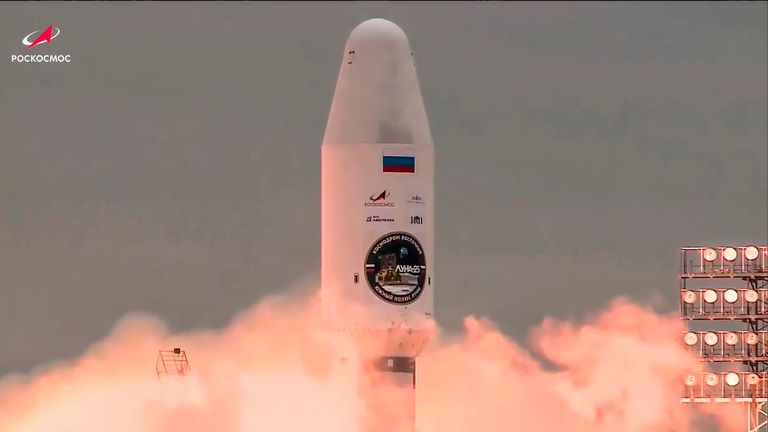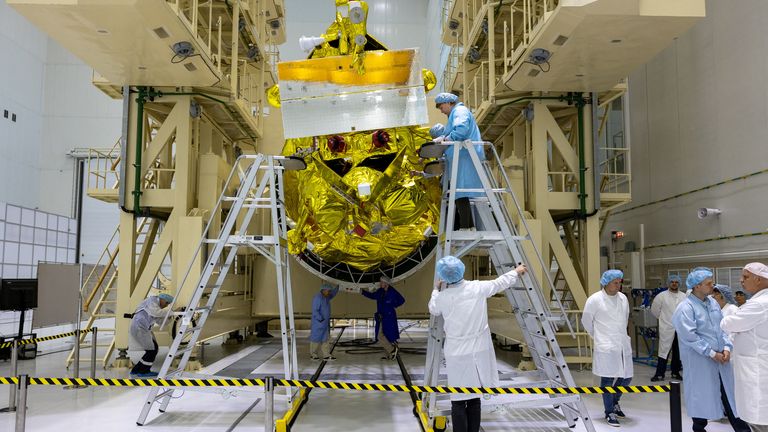Russia is aiming to become the first country to carry out a soft landing on the lunar south pole - a region thought to hold pockets of water ice.
Sunday 13 August 2023

A Soyuz rocket carrying the moon lander Luna-25 took off from the Vostochny cosmodrome on Friday.
Russian experts monitoring their moon-bound unmanned spacecraft Luna-25 have switched on its scientific equipment and started processing the first data.
Russia is aiming to become the first country to carry out a soft landing on the lunar south pole - a region thought to hold pockets of water ice.
Space agency Roscosmos said in a statement on Sunday: "Luna-25 continues its flight to the Earth's natural satellite - all systems of the automatic station are working properly, communication with it is stable, the energy balance is positive.
"The first measurement data on the flight to the moon has been obtained, and the project's scientific team has begun
processing it."
 Image:Specialists took part in preparations ahead of the launch
Image:Specialists took part in preparations ahead of the launch
On Friday, Moscow launched the mission - its first moon-landing craft in 47 years - and is racing against India which blasted its lunar lander Chandrayaan-3 into space last month.
Luna-25, which is the size of a small car, took off on board a Soyuz rocket from the Vostochny cosmodrome in the far eastern Amur region, over 3,000 miles east of Moscow.
It is expected to touch down on the moon on 21 August.
Russian experts monitoring their moon-bound unmanned spacecraft Luna-25 have switched on its scientific equipment and started processing the first data.
Russia is aiming to become the first country to carry out a soft landing on the lunar south pole - a region thought to hold pockets of water ice.
Space agency Roscosmos said in a statement on Sunday: "Luna-25 continues its flight to the Earth's natural satellite - all systems of the automatic station are working properly, communication with it is stable, the energy balance is positive.
"The first measurement data on the flight to the moon has been obtained, and the project's scientific team has begun
processing it."
 Image:Specialists took part in preparations ahead of the launch
Image:Specialists took part in preparations ahead of the launchOn Friday, Moscow launched the mission - its first moon-landing craft in 47 years - and is racing against India which blasted its lunar lander Chandrayaan-3 into space last month.
Luna-25, which is the size of a small car, took off on board a Soyuz rocket from the Vostochny cosmodrome in the far eastern Amur region, over 3,000 miles east of Moscow.
It is expected to touch down on the moon on 21 August.
Virgin Galactic takes first tourists to edge of space - as British ex-Olympian calls flight 'most exciting day of my life'
Related Topics:Space
Its mission is to collect samples of rock and dust to get an understanding of the environment for a potential base.
The lander plans to operate for a year on the south pole, where scientists at NASA and other space agencies have in recent years detected traces of water ice in the region's shadowed craters.
Rough terrain makes a landing there difficult.
But the prize of discovering water ice could be historic - as it may be used for fuel and oxygen, as well as for drinking water.
Read more on Sky News:
Why billionaires are drawn to 'extreme tourism'
US astronaut Neil Armstrong found fame in 1969 for being the first person to walk on the moon.
But the Soviet Union's Luna-2 mission was the first spacecraft to reach the planet's surface in 1959, and the Luna-9 mission in 1966 was the first to make a soft landing there.
Friday's launch marks Russia's first lunar mission since 1976, when it was part of the USSR.
No comments:
Post a Comment